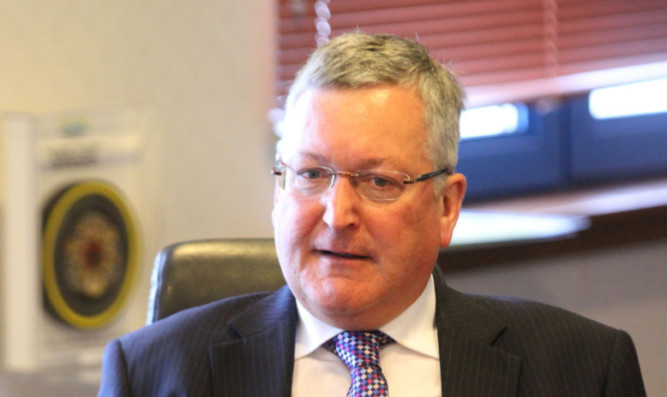Scotland’s Energy Minister, Fergus Ewing, hopes four major wind arrays in the firths of Forth and Tay will be built despite a major legal challenge to their development.
Bird protection charity RSPB Scotland sent shockwaves through the sector in Scotland earlier this month after a last-minute move to seek judicial review of Mr Ewing’s decision to grant consents for the Neart na Gaoithe, Inch Cape and Seagreen Alpha and Bravo arrays.
It is understood the RSPB’s application will come before the courts for the first time in late May and there are concerns within the industry the legal process will prove both costly and lengthy.
During an address to delegates at the Scottish Renewables’ offshore wind and supply chain conference in Aberdeen on Tuesday, Mr Ewing said the consents formed the “basis of a new industry in Scotland”.
And he said they had been granted following a “long, painstaking” process involving Marine Scotland, the Scottish Government directorate responsible for the integrated management of Scottish waters.
The four consented east coast arrays represent a potential investment of more than £7 billion and their scores of turbines would have the potential to produce enough power for more than 1.4 million homes.
Speaking to The Courier after his speech, Mr Ewing said he hoped the windfarms would go ahead as planned.
“We are very confident the processes followed by Marine Scotland were robust and comprehensive and that any challenge will be unsuccessful,” he said.
“The offshore wind projects offer enormous potential, not least for the citizens of Dundee, so I hope the projects will go ahead.”
Mr Ewing also tackled the issue of financial support for the wind sector through the Contracts for Difference (CfD) scheme and said it now appeared the scale of the UK Government’s ambitions for developing the industry were now significantly less than stated previously.
Only SSE’s joint venture Beatrice development in the outer Moray Firth has an investment contract and Mr Ewing called on delegates to join him in “hoping” that a Scottish project would be included in the forthcoming CfD allocation round.
The subject of CfD was also raised during a later panel session featuring Dan Finch, managing director of EDPR UK and development director of Moray Offshore Renewables, Repsol Nuevas UK managing director Ronnie Bonnar, SSE’s Beatrice project director Brian McFarlane and Jonathan Cole, offshore managing director for ScottishPower Renewables.
The panel were asked what impact there would be on their respective projects if they failed to secure the state-backed support.
Mr Cole said having forward financial visibility was key to a major infrastructure project while Mr Bonnar said an unsuccessful application for funding did not necessarily mean “game over”, although it would not be good news.
Mr Bonnar said it was inevitable given the support available that some developers would be left disappointed following the CfD round, but he said it was the process thereafter that would determine how the industry was shaped going forward.
Scottish Renewables chief executive Niall Stuart said the sector was at a critical stage in its development.
He said the past year had brought both positive and negative developments and warned there was no guarantee of success.
He urged developers and supply chain companies to work even more closely to drive innovation and cut costs, adding the drop in the oil price meant the renewables sector had to work even harder to compete with the traditional fossil fuel market.
